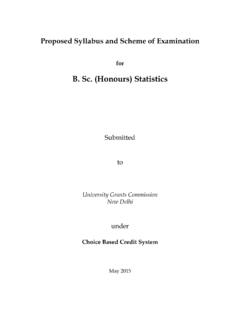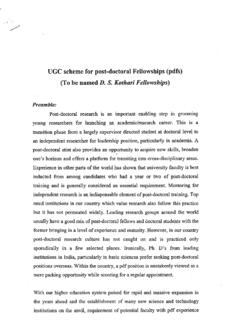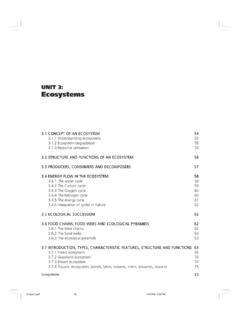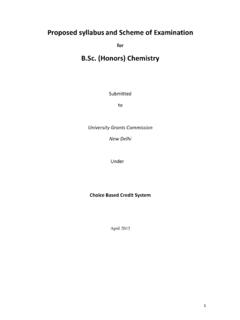Transcription of Environmental Studies For Undergraduate Courses - UGC
1 Environmental Studies For Undergraduate CoursesErach Bharucha ICORE MODULE SYLLABUS FOR Environmental Studies FOR UNDER GRADUATE Courses OF ALL BRANCHES OF HIGHER EDUCATION Vision The importance of Environmental science and Environmental Studies cannot be disputed. The need for sustainable development is a key to the future of mankind. Continuing problems of pollution, loss of forget, solid waste disposal, degradation of environment, issues like economic productivity and national security, Global warming, the depletion of ozone layer and loss of biodiversity have made everyone aware of Environmental issues.
2 The United Nations Coference on Environment and Development held in Rio de Janerio in 1992 and world Summit on Sustainable Development at Johannesburg in 2002 have drawn the attention of people around the globe to the deteriorating condition of our environment. It is clear that no citizen of the earth can afford to be ignorant of environment issues. Environmental management has captured the attention of health care managers. Managing Environmental hazards has become very important. Human beings have been interested in ecology since the beginning of civilization.
3 Even our ancient scriptures have emphasized about practices and values of Environmental conservation. It is now even more critical than ever before for mankind as a whole to have a clear understanding of Environmental concerns and to follow sustainable development practices. India is rich in biodiversity which provides various resources for people. It is also basis for biotechnology. Only about million living organisms have been diescribed and named globally. Still manay more remain to be identified and described. Attempts are made to IIconserve them in ex-situ and in-situ situations.
4 Intellectual property rights (IPRs) have become importanat in a biodiversity-rich country like India to protect microbes, plants and animals that have useful genetic properties. Destruction of habitats, over-use of energy resource and Environmental pollution have been found to be responsible for the loss of a large number of life-forms. It is feared that a large proportion of life on earth may get wiped out in the near future. Inspite of the deteriorating status of the environment, study of environment have so far not received adequate attention in our academic programmes.
5 Recognizing this, the Hon ble Supreme Court directed the UGC to introduce a basic course on environment at every level in college education. Accordingly, the matter was considered by UGC and it was decided that a six months compulsory core module course in Environmental Studies may be prepared and compulsorily implemented in all the University/Colleges of India. The experts committee appointed by the UGC has looked into all the pertinent questions, issues and other relevant matters. This was followed by framing of the core module syllabus for Environmental Studies for Undergraduate Courses of all branches of Higher Education.
6 We are deeply conscious that there are bound to be gaps between the ideal and real. Geniune endeavour is required to minimize the gaps by intellectual and material inputs. The success of this course will depend on the initiative and drive of the teachers and the receptive students. SYLLABUS Unit 1 : Multidisciplinary nature of Environmental Studies Definition, scope and importance (2 lectures) Need for public awareness. III Unit 2 : Natural Resources : Renewable and non-renewable resources : Natural resources and associated problems. a) Forest resources : Use and over-exploitation, deforestation, case Studies .
7 Timber extraction, mining, dams and their effects on forest and tribal people. b) Water resources : Use and over-utilization of surface and ground water, floods, drought, conflicts over water, dams-benefits and problems. c) Mineral resources : Use and exploitation, Environmental effects of extracting and using mineral resources, case Studies . d) Food resources : World food problems, changes caused by agriculture and overgrazing, effects of modern agriculture, fertilizer-pesticide problems, water logging, salinity, case Studies . e) Energy resources : Growing energy needs, renewable and non renewable energy sources, use of alternate energy sources.
8 Case Studies . f) Land resources : Land as a resource, land degradation, man induced landslides, soil erosion and desertification. Role of an individual in conservation of natural resources. Equitable use of resoureces for sustainable lifestyles. (8 lectures) Unit 3 : Ecosystems Concept of an ecosystem. IV Structure and function of an ecosystem. Producers, consumers and decomposers. Energy flow in the ecosystem. Ecological succession. Food chains, food webs and ecological pyramids. Introduction, types, characteristic features, structure and function of the following ecosystem :- a. Forest ecosystem b.
9 Grassland ecosystem c. Desert ecosystem d. Aquatic ecosystems (ponds, streams, lakes, rivers, oceans, estuaries) (6 lectures) Unit 4 : Biodiversity and its conservation Introduction Definition : genetic, species and ecosystem diversity. Biogeographical classification of India Value of biodiversity : consumptive use, productive use, social, ethical, aesthetic and option values Biodiversity at global, National and local levels. Inida as a mega-diversity nation V Hot-sports of biodiversity. Threats to biodiversity : habitat loss, poaching of wildlife, man-wildlife conflicts. Endangered and endemic species of India Conservation of biodiversity : In-situ and Ex-situ conservation of biodiversity.
10 (8 lectures) Unit 5 : Environmental Pollution Definition Cause, effects and control measures of :- a. Air pollution b. Water pollution c. Soil pollution d. Marine pollution e. Noise pollution f. Thermal pollution g. Nuclear hazards Solid waste Management : Causes, effects and control measures of urban and industrial wastes. Role of an individual in prevention of pollution. Pollution case Studies . Diaster management : floods, earthquake, cyclone and landslides.











